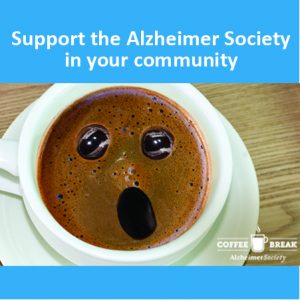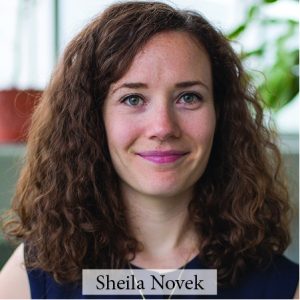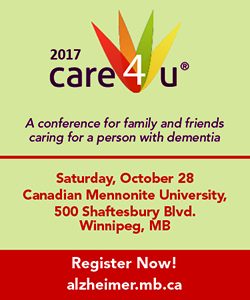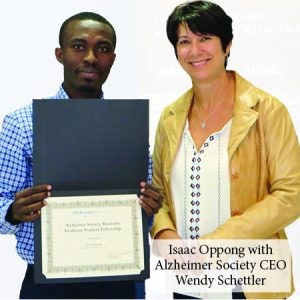In This Issue
True Colour of Community at Agape Villa Coffee Break® Event
The Challenges of Young Onset Dementia
Remember When? Building Relationships Through Reminiscence
Graduate Student Focusses on Access to Primary Health Care
Education and Programs
Events and Volunteering
True Colour of the Community Comes Out
at the Agape Villa Coffee Break® Event
 Marcy Schneider finds it satisfying to hold a Coffee Break® event at Agape Villa, the 55 plus life lease residence where she lives. The event is easy to coordinate, the response from fellow residents is great, and – best of all! – it raises money for the Alzheimer Society of Manitoba.
Marcy Schneider finds it satisfying to hold a Coffee Break® event at Agape Villa, the 55 plus life lease residence where she lives. The event is easy to coordinate, the response from fellow residents is great, and – best of all! – it raises money for the Alzheimer Society of Manitoba.
“People here make substantial donations, and they wait for this day to do it because for many, the Society is their chosen charity,” says Marcy, who hosted this year’s do on September 30. “If they know they’ll be away on the day of, they’ll knock on my door and bring me their donations early so they don’t miss out.”
Marcy is pleased to say that, while Agape Villa has only 70 suites, the amount collected during the event is always “big.” This year, supporters contributed $942, bringing the total amount raised for the Society since the event’s inception 17 years ago to over $9,000. “There are many older people in the building, and perhaps because of that, we all have friends or family members who have experienced this disease.”
 Agape Villa’s Coffee Break event was started by a former resident, the late Bryant Gunhouse; when he became ill, Marcy took on the coordination and has continued doing so for 12 years. She advertises through posters and a newsletter, and she supplies goodies to serve with the coffee provided by the Society. She also takes donations at the door of the cafeteria. Her husband, John, lends a hand by driving her down to the Society to deliver the proceeds.
Agape Villa’s Coffee Break event was started by a former resident, the late Bryant Gunhouse; when he became ill, Marcy took on the coordination and has continued doing so for 12 years. She advertises through posters and a newsletter, and she supplies goodies to serve with the coffee provided by the Society. She also takes donations at the door of the cafeteria. Her husband, John, lends a hand by driving her down to the Society to deliver the proceeds.
While the residents at Agape Villa meet for coffee six days a week, it is during the annual Coffee Break event that their true colours come out: they give generously and gratefully to a cause they believe in.
For information on hosting a Coffee Break event during October, click here.
The Challenges of Young Onset Dementia

Getting a diagnosis of dementia is never easy, but for those in their 50s or 60s, there are extra challenges to overcome.
When someone under the age of 65 is diagnosed, it is known as young onset dementia. This is the age group of interest to Sheila Novek, PhD Candidate in Community Health Sciences at the University of Manitoba.
“The majority of people who are diagnosed with dementia are older and retired, and while devastating, there may be no immediate financial impact,” she says. “But a person with young onset may still be working to bring in an income, and the spouse may still be working, and they may have a family to support.”
In these circumstances, the person affected may become unable to work, and the spouse may have to reduce their hours or give up work altogether to provide support. The financial impact could cause extreme hardship.
“Because of the financial strains, these families need to navigate information on things like workplace accommodation, disability benefits and early retirement – not the usual things people of that age are thinking about,” says Sheila.
Sheila will present on the topic of young onset dementia at the Alzheimer Society’s Care4u Family Conference on Saturday, October 28 at the Canadian Mennonite University. She will co-present with Dr. Mandana Modirrousta of the Department of Psychiatry at the University of Manitoba.
 As well as the financial ramifications, Sheila has observed other challenges for those with young onset dementia, such as finding programs that meet the needs of people who may be more physically active than older adults. Also, younger individuals often have different leisure interests; for example, individuals who have recently been forced to leave the workforce may be interested in programs and volunteer opportunities that utilize their skills and provide meaningful activity.
As well as the financial ramifications, Sheila has observed other challenges for those with young onset dementia, such as finding programs that meet the needs of people who may be more physically active than older adults. Also, younger individuals often have different leisure interests; for example, individuals who have recently been forced to leave the workforce may be interested in programs and volunteer opportunities that utilize their skills and provide meaningful activity.
“The challenge is providing specialized services for a relatively small population that is spread out geographically,” explains Sheila.
To learn more about young onset dementia, including symptoms, diagnosis, progression and treatment options, don’t miss Sheila and Mandana’s afternoon concurrent session at the Care4u Family Conference. Click here to register and for more information.
Remember When?
Building Relationships Through Reminiscence

Reminiscing with a family member or friend offers the person with dementia the opportunity to revisit past activities and experiences. Sensory stimuli such as photographs, familiar objects, music, food with distinctive flavours and fragrance can evoke memories and spark conversations. Sharing familiar stories brings a sense of comfort for the person with dementia and focuses on the emotional ties with events of the past.
Some ways to assist in reminiscence are:
- Ask questions about the past. Use open-ended questions such as, “What did you like most about living on the farm?” to encourage the person to share as many stories and experiences as they wish.
- Stimulate as many senses as possible. Have an object for the person to look at, listen to, taste, smell or feel. Personal objects that appeal to the senses can enhance recall.
- Look at items that will remind the person with dementia and yourself of things you have done together. This will help the person to recall your relationship.
- Find common ground. Choose topics of conversation that appeal to both of you: sports, crafts, travel or gardening. The possibilities are endless!
- Keep it simple. Focus on one topic at a time. Use short and simple sentences.
- Use reminiscence often. The activity can be used at any visit or during regular caregiving tasks.
Reminiscence encourages care partners to tune in to the story, make connections and ask questions that can led to engaging conversations. Through reminiscence, care partners can maintain relationships and find a vibrant way to spent time with a family member or friend.
Graduate Student Focuses on
Access to Primary Health Care
 Isaac Oppong wants life to be little easier for people with dementia and their families. One way to make this happen, he asserts, is through adequate access to primary health care.
Isaac Oppong wants life to be little easier for people with dementia and their families. One way to make this happen, he asserts, is through adequate access to primary health care.
Isaac, a Master’s student in Disability Studies at the University of Manitoba, is conducting a study in Winnipeg to investigate this. It asks families about the types of primary health care services available for their relatives living with dementia, the challenges encountered in accessing these services, and some responses that families perceive as beneficial to addressing these difficulties in Manitoba.
These are important questions, and Isaac will investigate them as the recipient of the 2017-18 Alzheimer Society of Manitoba’s Graduate Student Fellowship award. Worth $4,000, this award will assist Isaac with his study, Families’ Perspectives on Access to Primary Health Care Services for Relatives Living with Dementia in Manitoba.
“Dementia is an epidemic – it is projected that by 2038, more than one million people in Canada will live with dementia, which represents more than 2.7% of the population,” he says. On top of that, Isaac’s background research revealed that families bear a heavy load when it comes to caregiving. He reports results of a study done in Manitoba projecting that, by 2038, the number of hours that will be spent on the delivery of informal care to individuals living with dementia will be more than double the number of hours spent during the early part of the 21st century.
Using a qualitative research design, Isaac will conduct interviews with a minimum of eight families who have relatives living with dementia. “I am selecting families that have been involved in the care of a family member with dementia for at least two years,” he says. “This will give credibility to the results as the families will be able to supply accurate, up-to-date information on their experiences.”
 Interviews with families will take place over the winter of 2018, and by May, Isaac plans to report on specific issues people with dementia face when accessing primary health services based on the information provided by families. By identifying the gaps, future policy and practice regarding access to services can be addressed and improvements eventually made.
Interviews with families will take place over the winter of 2018, and by May, Isaac plans to report on specific issues people with dementia face when accessing primary health services based on the information provided by families. By identifying the gaps, future policy and practice regarding access to services can be addressed and improvements eventually made.
The Alzheimer Society is pleased to support Isaac’s important study through its Graduate Student Fellowship grant.
Education and Programs
Events & Volunteering
